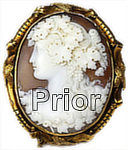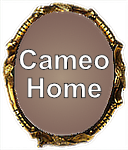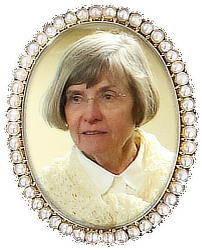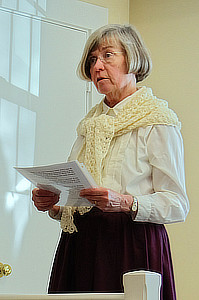
Whittier Cameo
Elizabeth Whittier Pickard
Elizabeth Whittier Pickard

|

|

|
 Played by Mary Ertl
Played by Mary Ertl
 mother, sister, and aunt had died, leaving him lonely in his Amesbury house. It was written at the end of
the Civil War, when the whole nation was feeling loss too, and longing for times past. The success of the
poem catapulted him to financial security; he received $10,000 in royalties for the first printing. From
this fame almost all of his writings went on to be best sellers.
When I finished school I went to Richmond, VA to teach in a school for Negroes and taught at other
places in the south. Coming north during the cooler summers, I would accompany my uncle to one of his
favorite places - the Isles of Shoals - and these were always pleasant visits.
I was married in my uncle's Amesbury home when I was 30 years old. As his health deteriorated, I helped
him pack up when he decided to move to Oak Knoll. There he would have the company of his three
women cousins Caroline, Abby, and Mary, and Abby's daughter, Phoebe Woodman.
In 1893, a year after my Uncle's death, I returned all the birthplace furniture when I found that the
homestead was going to become a museum. My husband, Samuel T. Pickard, was my uncle's first official
biographer.
I was also instrumental in the establishment of the Whittier Home Association. At the turn of the 19th
century, a movement had begun nationally to form a Federation of Women's Clubs "to broaden the
thoughts and aims of women, to give them an intelligent interest not only in literature, art and music,
but in education and philanthropy and in all the affairs of the day in town and country." In keeping with
these ideals, twenty-two women met in 1898 to organize a society to honor the memory of my uncle. I
leased this group the home for five years for the sum of $100/year, on the condition that they would
honor him and his writings, and care for the artifacts, as well as his personal papers. The organization is still in
existence today, successfully running the Whittier Home.
mother, sister, and aunt had died, leaving him lonely in his Amesbury house. It was written at the end of
the Civil War, when the whole nation was feeling loss too, and longing for times past. The success of the
poem catapulted him to financial security; he received $10,000 in royalties for the first printing. From
this fame almost all of his writings went on to be best sellers.
When I finished school I went to Richmond, VA to teach in a school for Negroes and taught at other
places in the south. Coming north during the cooler summers, I would accompany my uncle to one of his
favorite places - the Isles of Shoals - and these were always pleasant visits.
I was married in my uncle's Amesbury home when I was 30 years old. As his health deteriorated, I helped
him pack up when he decided to move to Oak Knoll. There he would have the company of his three
women cousins Caroline, Abby, and Mary, and Abby's daughter, Phoebe Woodman.
In 1893, a year after my Uncle's death, I returned all the birthplace furniture when I found that the
homestead was going to become a museum. My husband, Samuel T. Pickard, was my uncle's first official
biographer.
I was also instrumental in the establishment of the Whittier Home Association. At the turn of the 19th
century, a movement had begun nationally to form a Federation of Women's Clubs "to broaden the
thoughts and aims of women, to give them an intelligent interest not only in literature, art and music,
but in education and philanthropy and in all the affairs of the day in town and country." In keeping with
these ideals, twenty-two women met in 1898 to organize a society to honor the memory of my uncle. I
leased this group the home for five years for the sum of $100/year, on the condition that they would
honor him and his writings, and care for the artifacts, as well as his personal papers. The organization is still in
existence today, successfully running the Whittier Home.